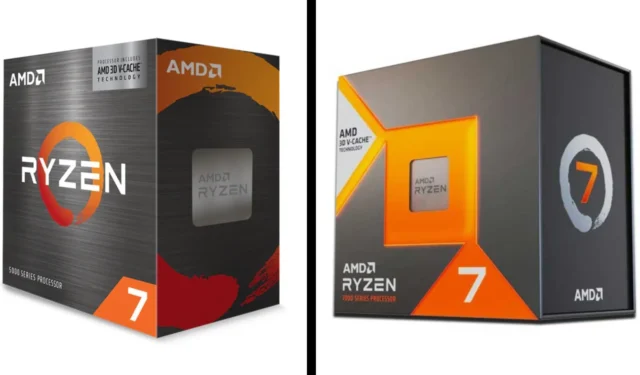
The AMD Ryzen 7 7800X3D is the follow-up to the Ryzen 7 5800X3D, which was the first chip to have 3D V-cache. The new processor has a bigger L3 cache, faster operating speeds, the ability to be overclocked, and a completely new design.
Because of this, the 7800X3D is a good choice for gamers who want to build a new high-end gaming system with the newest PC hardware. But the price of the 5800X3D has gone down enough in the last few months to make it a good choice for some.
In this article, we’ll look at every part of these chips, from performance benchmarks to comparisons of specs, to figure out which one is best for gaming.
Both Ryzen 7 7800X3D and 5800X3D have a lot going for them.
While looking into the two similar chips from the last generation, it’s clear that it can be hard to choose between them. For the newest graphics cards on the market, both processors are very fast. So, one might have to think about other things, such as the platform and the memory support.
When choosing between these eight-core processors, there are other things to think about.
Specifications
If you look at the details of the Ryzen 7 5800X3D and the 7800X3D closely, you might not learn much about them. They have the same number of cores and threads and only small differences in the amount of cache and TDP.
| Ryzen 7 5800X3D | Ryzen 7 7800X3D | |
| Architecture | Zen 3 | Zen 4 |
| Core count | 8 | 8 |
| Thread count | 16 | 16 |
| Maximum boost clock | 4.5 GHz | 5.6 GHz |
| L3 cache | 96 MB | 104 MB |
| TDP | 105 W | 120 W |
The lower-end Ryzen 7 7800X3D doesn’t have a CCD design with a 3D V-cache in one core and a regular computing core in the other. But the main changes are in the cores that make the chips work. AMD says that each Zen 4 core is about 15% to 20% faster than its predecessor.
The Ryzen 7 7800X3D also works with DDR5 memory, which speeds up computing. Even though this is small, it should improve performance overall.
Performance difference
When it comes to synthetic benchmarks, the Ryzen 7 7800X3D beats the 5800X3D hands down. In every test, the newer chip beats the Zen 3 chip by a huge margin.
| Ryzen 7 5800X3D | Ryzen 7 7800X3D | |
| Cinebench R23 single-core | 1442 | 2127 |
| Cinebench R23 multi-core | 14799 | 22856 |
| Geekbench 5 single-core | 1629 | 2245 |
| Geekbench 5 multi-core | 11562 | 16194 |
But it’s important to remember that synthetic benchmarks don’t show how good 3D chips really are. Real-world tasks like gaming and rendering are where they shine.
We can see how the AMD processors compare up in video games thanks to YouTuber TheSpyHood, who combined the AMD chips with the Core i7 13700K, Team Blue’s newest opponent with an RTX 4090.
| Ryzen 7 5800X3D | Ryzen 7 7800X3D | Core i7 13700K | |
| Cyberpunk 2077 | 112 | 136 | 123 |
| The Days Gone | 185 | 221 | 204 |
| God of War | 229 | 262 | 247 |
| Hitman III | 163 | 189 | 181 |
The comparison above indicates that the Ryzen 7 7800X3D is significantly quicker than its predecessor. It even outperforms the Core i7 13700K. It’s worth mentioning that Intel had been undermining AMD’s offers until the 3D processors arrived a few weeks ago.
Retail prices
It’s worth mentioning that the 5800X3D is significantly less expensive than Team Red’s most recent mid-range offering. On Newegg, the last-generation chip is advertised for $328. The 7800X3D costs $399, while the 13700K costs $417.
Anyone seeking for a low-cost processor for their computing needs should choose the 5800X3D over the Ryzen 7 7800X3D. It continues to shine in the most recent video games.




Leave a Reply